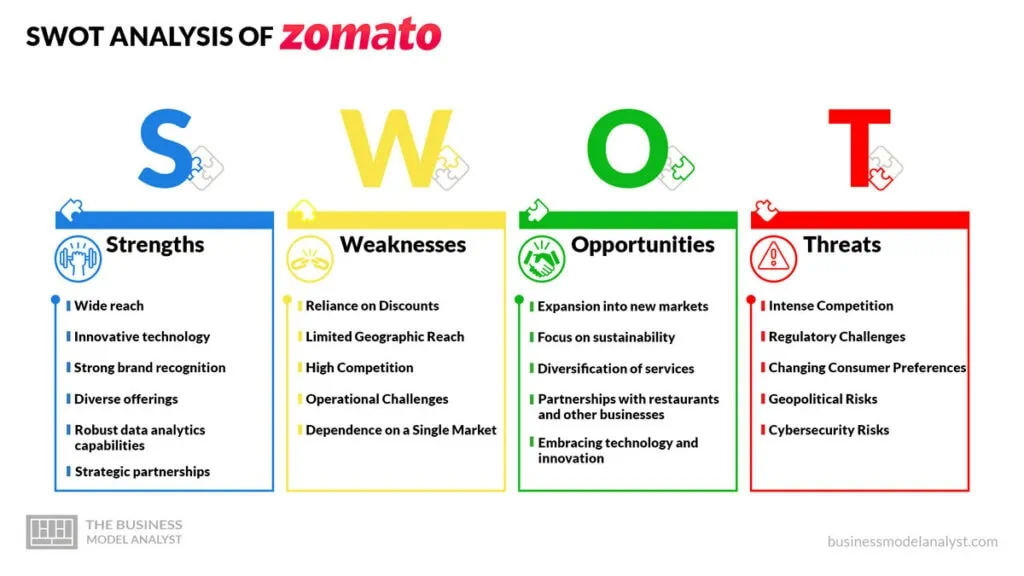Zomato is an Indian food delivery and restaurant discovery platform founded in July 2008 by Deepinder Goyal and Pankaj Chaddah. Initially, it was launched under “Foodiebay” but later changed to Zomato in 2010. The company has successfully created a one-stop platform that connects millions of foodies with restaurants and vice versa. It provides information on restaurant menus, prices, locations, user reviews, and ratings. It has also diversified its services by offering online ordering and delivery services.
The company’s most significant success has been its expansion into 24 countries and over 10,000 cities globally. In 2015, it acquired the American restaurant discovery service, Urbanspoon, to expand its presence in the United States. However, it failed to expand into the online event ticketing industry, which resulted in enormous losses for the company. Zomato currently employs over 6,000 people and is in countries such as the United States, Canada, Australia, the United Kingdom, and the United Arab Emirates.
Zomato stands out in the marketplace because it offers a comprehensive platform for foodies to discover and engage with restaurants. Its user-friendly interface and the sheer number of restaurants and cuisines it covers are vital factors in its success. Additionally, the company’s expansion into the online ordering and delivery space has made it a formidable player in the food delivery industry.
Now, let’s jump into a detailed investigation of the Zomato SWOT analysis.
Contents
Zomato Strengths
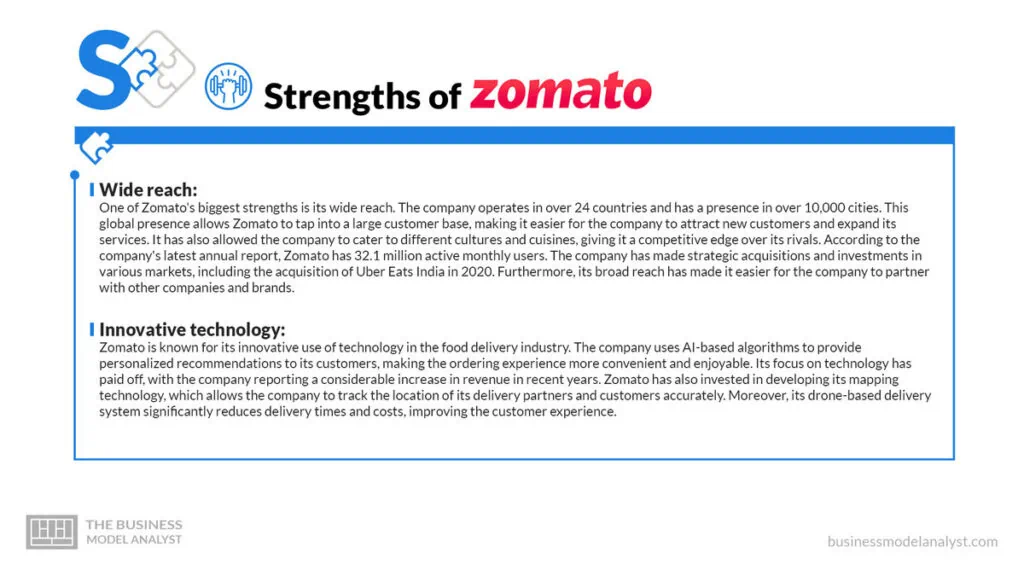
Below, there are some of the qualities that make Zomato stand out in the global market:
Wide reach
One of Zomato’s biggest strengths is its wide reach. The company operates in over 24 countries and has a presence in over 10,000 cities. This global presence allows Zomato to tap into a large customer base, making it easier for the company to attract new customers and expand its services. It has also allowed the company to cater to different cultures and cuisines, giving it a competitive edge over its rivals. According to the company’s latest annual report, Zomato has 32.1 million active monthly users. The company has made strategic acquisitions and investments in various markets, including the acquisition of Uber Eats India in 2020. Furthermore, its broad reach has made it easier for the company to partner with other companies and brands.
Innovative technology
Zomato is known for its innovative use of technology in the food delivery industry. The company uses AI-based algorithms to provide personalized recommendations to its customers, making the ordering experience more convenient and enjoyable. Its focus on technology has paid off, with the company reporting a considerable increase in revenue in recent years. Zomato has also invested in developing its mapping technology, which allows the company to track the location of its delivery partners and customers accurately. Moreover, its drone-based delivery system significantly reduces delivery times and costs, improving the customer experience.
Strong brand recognition
Zomato has built a strong brand image over the years, with its name becoming synonymous with online food delivery as a result of the company’s consistent focus on delivering high-quality services and customer experiences. For instance, its successful IPO has further boosted its brand value, which saw its stock price soar by over 80% on the first trading day. Also, it has helped it attract a large customer base and has allowed it to expand its services beyond food delivery to include online ordering, table reservations, and more. The company’s brand image is reinforced by its popular social media presence, with over 10 million followers on Instagram.
Diverse offerings
Asides from food delivery, Zomato offers a wide range of services, including online ordering, table reservations, and reviews of restaurants. The company’s online ordering and table reservation services have made it easier for customers to discover and order from their favorite restaurants. This diversity of offerings allows the company to cater to a wide range of customer needs, making it more attractive to potential users. Zomato’s review system also provides valuable feedback to restaurants, enabling them to improve their services and attract more customers. Furthermore, the company’s foray into the grocery delivery space in 2020 has allowed it to tap into a new market and expand its offerings.
Robust data analytics capabilities
Zomato’s data analytics capabilities are another key strength. The company collects and analyzes data on customer behavior, restaurant preferences, and delivery trends to optimize its services and improve the customer experience. It also uses data analytics to personalize its recommendations and promotions, increasing the likelihood of customer engagement and repeat business. This makes it easy to make informed business decisions, identify new business opportunities, and develop targeted marketing strategies by analyzing sales trends and customer behavior. The company’s data analytics capabilities have also enabled it to expand into new markets, streamline its operations, reduce costs, and increase efficiency, contributing to its overall profitability.
Strategic partnerships
Zomato has established strategic partnerships with some companies in the food industry, including PepsiCo and KFC. These partnerships have allowed the company to expand its offerings and attract new customers. For example, Zomato’s partnership with PepsiCo enables customers to order PepsiCo products alongside their foods. In contrast, its partnership with KFC has enabled the company to deliver KFC’s products directly to customers. Its partnership with Swiggy, a rival food delivery company in India, has also allowed the company to pool its resources and compete more effectively in the market. It has over 300,000 restaurant partners worldwide. Its strategic partnerships have been instrumental in helping the company expand its services and attract new customers. Also, the company also partners with various payment gateways and banks to make it easier for customers to make payments and avail of discounts and cashback offers.
Strong customer support
Zomato’s customer support team is known for its prompt and efficient handling of customer queries and complaints. The company has invested in developing a chatbot system that can handle many customer inquiries, ensuring that customers receive quick and helpful responses to their queries. In addition, Zomato has also established a solid social media presence, where customers can connect with the company and receive support. Its customer support team is available 24/7, ensuring that customers can receive assistance at any time of the day or night. Moreover, Zomato’s customer support team is highly trained and knowledgeable about its services, enabling them to solve customer problems effectively.
Zomato Weaknesses
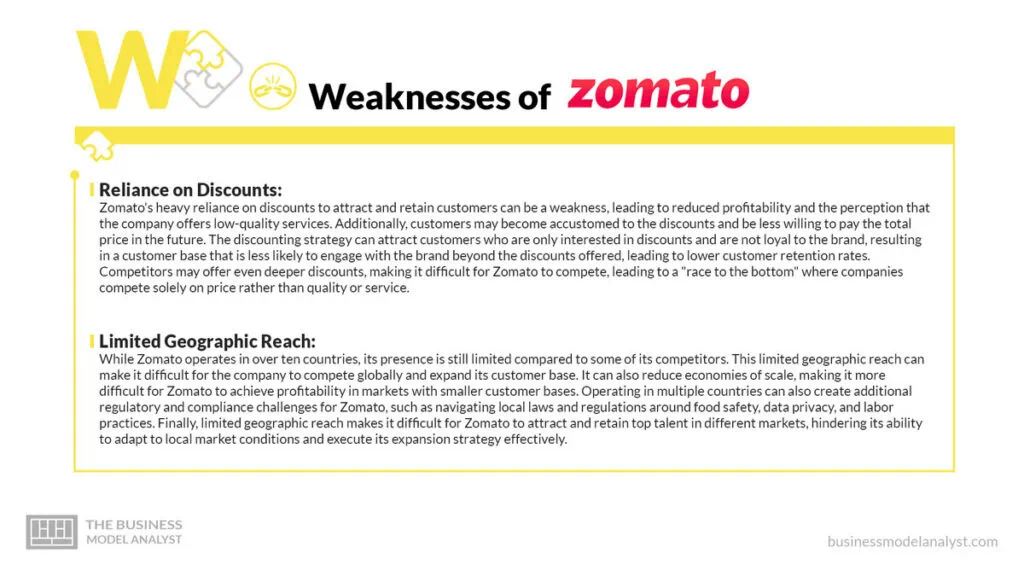
Here are some of Zomato’s weaknesses:
Reliance on Discounts
Zomato’s heavy reliance on discounts to attract and retain customers can be a weakness, leading to reduced profitability and the perception that the company offers low-quality services. Additionally, customers may become accustomed to the discounts and be less willing to pay the total price in the future. The discounting strategy can attract customers who are only interested in discounts and are not loyal to the brand, resulting in a customer base that is less likely to engage with the brand beyond the discounts offered, leading to lower customer retention rates. Competitors may offer even deeper discounts, making it difficult for Zomato to compete, leading to a “race to the bottom” where companies compete solely on price rather than quality or service.
Limited Geographic Reach
While Zomato operates in over ten countries, its presence is still limited compared to some of its competitors. This limited geographic reach can make it difficult for the company to compete globally and expand its customer base. It can also reduce economies of scale, making it more difficult for Zomato to achieve profitability in markets with smaller customer bases. Operating in multiple countries can also create additional regulatory and compliance challenges for Zomato, such as navigating local laws and regulations around food safety, data privacy, and labor practices. Finally, limited geographic reach makes it difficult for Zomato to attract and retain top talent in different markets, hindering its ability to adapt to local market conditions and execute its expansion strategy effectively.
High Competition
Zomato operates in a highly competitive market, with numerous food delivery giants like Swiggy, Uber Eats, and Foodpanda competing for the same customer base. The intense competition can lead to pricing wars, lower margins, and reduced profitability for Zomato. It can also result in increased marketing and advertising costs for Zomato as the company seeks to stand out in a crowded market and focus on short-term gains rather than long-term sustainability, as companies look to gain market share at any cost. Lastly, high competition can make it difficult for Zomato to differentiate itself from its competitors, leading to a commoditization of the food delivery industry and customers choosing based solely on price or delivery time rather than the quality of the food or the overall customer experience.
Operational Challenges
Zomato faces numerous operational challenges as a food delivery company, such as delivery delays, food quality issues, and logistical problems. These issues can result in negative customer feedback and reduced customer loyalty, ultimately hurting the company’s profitability. Furthermore, these challenges also increase costs for Zomato, as it may need to invest in additional technology, training, or logistics to address the issues. They pressure its relationships with restaurant partners, who may be held responsible for issues outside their control, such as delivery delays or food quality issues. Finally, they impact Zomato’s ability to scale and expand into new markets, as the company must maintain the same level of service and quality as it grows.
Dependence on a Single Market
Zomato’s reliance on the Indian market is a major weakness. The company generates a significant portion of its revenue from India, making it vulnerable to economic fluctuations and regulatory changes in the market. This dependence on a single market limits the company’s growth potential and increases its susceptibility to market risks.
Also, it limits Zomato’s ability to diversify its revenue streams and offer customers a more comprehensive range of services. It makes it difficult for Zomato to compete globally, as it may lack the resources and expertise to enter new markets successfully. The Indian market is highly competitive, with numerous players vying for market share. Zomato’s dependence on this market means that it must continuously innovate and adapt to remain competitive, which can be challenging given the intense competition.
Zomato Opportunities
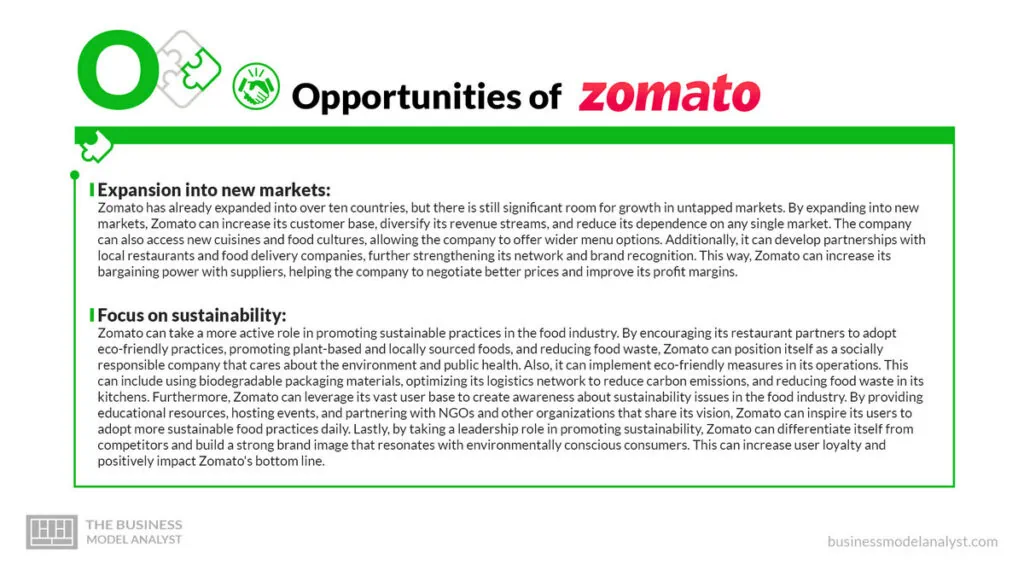
Despite the successes Zomato has enjoyed, it can achieve more. Below are some opportunities it can take advantage of:
Expansion into new markets
Zomato has already expanded into over ten countries, but there is still significant room for growth in untapped markets. By expanding into new markets, Zomato can increase its customer base, diversify its revenue streams, and reduce its dependence on any single market. The company can also access new cuisines and food cultures, allowing the company to offer wider menu options. Additionally, it can develop partnerships with local restaurants and food delivery companies, further strengthening its network and brand recognition. This way, Zomato can increase its bargaining power with suppliers, helping the company to negotiate better prices and improve its profit margins.
Focus on sustainability
Zomato can take a more active role in promoting sustainable practices in the food industry. By encouraging its restaurant partners to adopt eco-friendly practices, promoting plant-based and locally sourced foods, and reducing food waste, Zomato can position itself as a socially responsible company that cares about the environment and public health. Also, it can implement eco-friendly measures in its operations. This can include using biodegradable packaging materials, optimizing its logistics network to reduce carbon emissions, and reducing food waste in its kitchens. Furthermore, Zomato can leverage its vast user base to create awareness about sustainability issues in the food industry. By providing educational resources, hosting events, and partnering with NGOs and other organizations that share its vision, Zomato can inspire its users to adopt more sustainable food practices daily. Lastly, by taking a leadership role in promoting sustainability, Zomato can differentiate itself from competitors and build a strong brand image that resonates with environmentally conscious consumers. This can increase user loyalty and positively impact Zomato’s bottom line.
Diversification of services
While Zomato is primarily known for its food delivery services, there is an opportunity for the company to diversify its offerings and provide additional value to its customers. This could include offering meal planning and grocery delivery services, or partnering with other companies to offer discounts and promotions to customers. This diversification can also help Zomato to reduce its reliance on food delivery as its primary revenue stream and increase its overall profitability. It can also give Zomato a competitive advantage over other food delivery companies, allowing it to differentiate itself in a crowded market and establish itself as a one-stop shop for all food-related needs. Additionally, the company can attract and retain customers who may not have previously used its food delivery services, expanding its customer base and increasing revenue.
Partnerships with restaurants and other businesses
Zomato can build strategic partnerships with restaurants and other businesses to offer customers a wider range of services and promotions, such as partnering with grocery stores to offer delivery services or partnering with travel companies to offer discounts on hotel and flight bookings. These partnerships can give Zomato a competitive advantage over other food delivery companies, as it offers unique promotions and discounts to its customers. Furthermore, they can help the company strengthen its relationships with restaurant partners, increasing loyalty and trust. Zomato can also access new markets and customer segments, diversify its revenue streams, and reduce its dependence on food delivery as its primary source of revenue.
Embracing technology and innovation
As a technology-driven company, Zomato can leverage emerging technologies to improve its services and increase customer satisfaction. This could include using artificial intelligence to personalize customer recommendations or drones for faster and more efficient delivery. It can also invest in its mobile app and website to make it more user-friendly and intuitive. Embracing technology and innovation can also help Zomato to stay ahead of the competition by offering cutting-edge services and features that other food delivery companies may not be able to provide. This way, the company can also attract and retain younger, tech-savvy customers who may be more likely to use its services, streamline its operations, and reduce costs, leading to increased profitability and long-term growth.
Zomato Threats
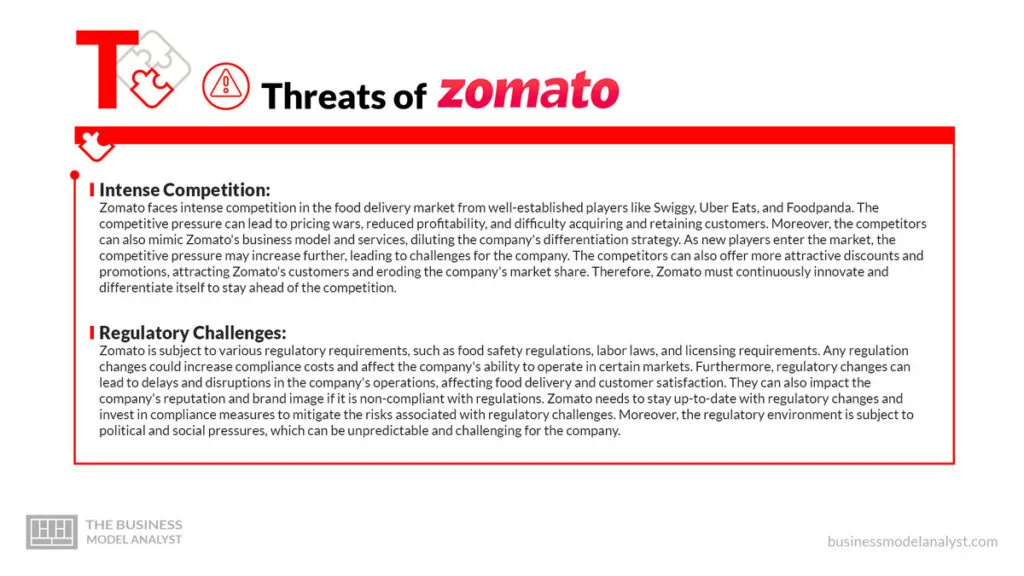
Below, there are some threats Zomato needs to eliminate:
Intense Competition
Zomato faces intense competition in the food delivery market from well-established players like Swiggy, Uber Eats, and Foodpanda. The competitive pressure can lead to pricing wars, reduced profitability, and difficulty acquiring and retaining customers. Moreover, the competitors can also mimic Zomato’s business model and services, diluting the company’s differentiation strategy. As new players enter the market, the competitive pressure may increase further, leading to challenges for the company. The competitors can also offer more attractive discounts and promotions, attracting Zomato’s customers and eroding the company’s market share. Therefore, Zomato must continuously innovate and differentiate itself to stay ahead of the competition.
Regulatory Challenges
Zomato is subject to various regulatory requirements, such as food safety regulations, labor laws, and licensing requirements. Any regulation changes could increase compliance costs and affect the company’s ability to operate in certain markets. Furthermore, regulatory changes can lead to delays and disruptions in the company’s operations, affecting food delivery and customer satisfaction. They can also impact the company’s reputation and brand image if it is non-compliant with regulations. Zomato needs to stay up-to-date with regulatory changes and invest in compliance measures to mitigate the risks associated with regulatory challenges. Moreover, the regulatory environment is subject to political and social pressures, which can be unpredictable and challenging for the company.
Changing Consumer Preferences
Consumer preferences and tastes constantly evolve, and Zomato needs to adapt to stay relevant. Failure to do so could lead to reduced demand for its services and a decline in market share. With the COVID-19 pandemic, there has been a significant shift towards home-cooked meals, which may impact the demand for food delivery services. Additionally, consumers are becoming increasingly health-conscious, leading to a preference for healthier food options that Zomato may need to provide. The growing trend of plant-based diets and veganism may also affect the company’s offerings, as it needs to cater to these changing preferences to remain competitive. Moreover, consumers are becoming more environmentally conscious and may prefer companies to prioritize sustainability and eco-friendliness in their operations.
Geopolitical Risks
Zomato operates in multiple countries, which exposes it to geopolitical risks, such as political instability and changes in trade policies. These risks can negatively impact the company’s operations and financial performance. Furthermore, Zomato’s international expansion strategy could be affected by political tensions or economic downturns in specific countries or regions. Trade restrictions, tariffs, and other trade barriers can impact the company’s supply chain and increase costs. The company may also face challenges complying with different regulatory frameworks across its international markets, increasing operational costs. Finally, geopolitical risks can affect customer behavior and spending patterns, reducing demand for Zomato’s services.
Cybersecurity Risks
Zomato collects a significant amount of customer data, including payment information, which makes it vulnerable to cyber-attacks and data breaches. Any security breaches could damage the company’s reputation and lead to legal and financial liabilities. Furthermore, the increasing frequency and sophistication of cyberattacks pose a significant threat to Zomato’s cybersecurity defenses. The company’s reliance on third-party vendors for various services and technologies could increase its exposure to cybersecurity risks. The cost of implementing and maintaining effective cybersecurity measures is also a challenge, and failure to invest in cybersecurity could result in significant losses for the company. Finally, the increasing adoption of remote work and cloud technologies in response to the COVID-19 pandemic has increased the risk of cyberattacks — therefore, Zomato must take appropriate measures to mitigate this threat.
Conclusion
Zomato is a leading player in the food delivery and restaurant discovery industry, with a global presence and a strong brand reputation. However, the company faces several challenges and threats, such as intense competition, dependence on a single market, regulatory challenges, and cybersecurity risks.
To maintain its competitive edge and sustain its growth, Zomato needs to capitalize on opportunities like expanding into new markets, diversifying its services, leveraging data to improve operations, building strategic partnerships, and embracing technology and innovation. By addressing its weaknesses and mitigating its threats, Zomato can continue to thrive and provide value to its customers and stakeholders.


